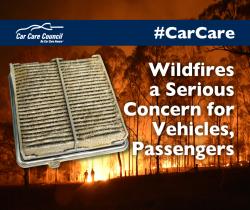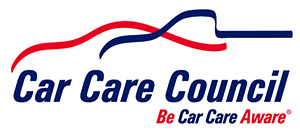
As wildfires engulf the West, the non-profit Car Care Council reminds car owners to have their cabin air filters and engine air filters inspected and changed regularly to ensure they are providing maximum protection from smoke and debris.
Cabin air filters are the first line of defense against contaminants that reduce vehicle cabin air quality for vehicle owners and their passengers. The Car Care Council recommends that motorists in areas impacted by wildfires and those in surrounding states have their cabin air filters replaced. This simple, yet important, service will help ensure vehicle longevity as well as clean air inside the car.
The cabin air filter is responsible for cleaning the air entering the passenger compartment. Under normal circumstances, it helps trap pollen, bacteria, dust and exhaust gases that may find their way into a vehicle’s heating, ventilation and air conditioning (HVAC) system, compromising interior air quality and damaging the system. The filter also prevents leaves, bugs and other debris from entering the HVAC system, which could also cause problems.
Most cabin air filters are accessed through the panel in the HVAC housing, which may be under the hood or placed within the interior of the vehicle. A cabin air filter should not be cleaned and reinstalled. Instead, it should be replaced every 19,000 to 24,000 kilometers or per the owner’s manual. In areas with heavy airborne contaminants, such as soot, smoke and debris from wildfires, it should be changed more frequently.
It’s important not to overlook the engine air filter. Engine air filters trap dirt particles, including soot, which can cause costly engine damage. They also plays a critical role in keeping smoke and debris from contaminating the airflow sensor on fuel-injected cars. As a rule of thumb, air filters should be inspected at each oil change and replaced annually or when showing other signs of contamination.
To learn more about vehicle air filters, visit www.carcare.org and view the “Air Filter Maintenance” video on the Car Care Council’s YouTube channel at www.youtube.com/carcaretips.
